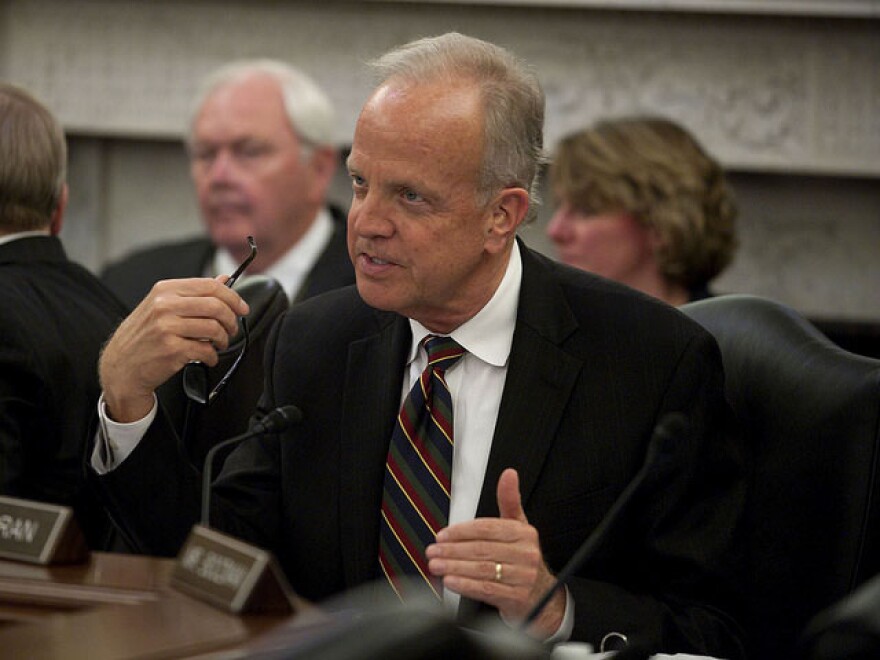Kansas Sen. Jerry Moran has what amounts to a running feud going with the U.S. Department of Veterans Affairs. He says the agency is dragging its feet implementing a new law called the Veterans Access, Choice and Accountability Act of 2014 that’s designed to help veterans in rural areas get the care they need.
But Robert McDonald, the new VA secretary, says Moran’s claims are baseless.
Finding alternative ways to get health care services to veterans who live in rural areas — far from VA medical centers — has been a priority for Moran since his early days in the U.S. House of Representatives.
“I represented a congressional district that was larger than the state of Illinois,” Moran said. “The First District of Kansas has lots of square miles — no VA hospital. So what we’ve been interested in is how do you get services when there’s no VA hospital close by? How do you get services to those veterans? And the answer initially was outpatient clinics.”
In part due to Moran’s efforts, the VA now operates 15 outpatient clinics in communities across Kansas. But there are still parts of Kansas — especially in the west — where veterans have to drive a long way to get to one of those clinics.
“But if you’re a 92-year-old World War II veteran in Atwood, Kansas, how do you get to an outpatient clinic in Hays or Burlington? There are many veterans whose problems we did not solve,” Moran said.
So last year Moran helped push for and pass the Choice Act. Among other things, it requires the VA to pay local doctors for providing care to veterans who live more than 40 miles from the nearest VA health care facility.
But Moran said the VA seems intent on undermining the law. Examples he cites are the agency’s stricter-than-necessary interpretation of the 40-mile rule and its decision to enforce the 40-mile rule even when the nearest VA facility doesn’t provide the particular services that a veteran needs.
“The VA is interpreting this legislation in a way that makes it difficult for veterans to access that health care,” Moran said. “And the hope that the Choice Act provided — while it’s beneficial to some, in some instances it’s working well — in many instances the VA, it seems to me, has gone out of its way to make it less likely that veterans get the services they need.”
Finally, Moran said he’s convinced VA officials want to divert Choice Act funding to other priorities, such as completing a new medical center in Denver that has suffered huge cost overruns.
“Because of, in my view, the VA’s desire to protect its resources internally,” he said. “They don’t like writing checks to something outside the VA. They want to keep the resources within the VA.”

VA Secretary McDonald responded to Moran’s charges at a recent meeting of health care journalists and rejected the notion that the VA is trying to undermine the Choice Act.
“Despite what you may have heard, we’re very much in favor of community care,” McDonald said. “Right now, even before the Choice Act, 20 percent of our appointments have been outside, in the community — 20 percent. So it’s hard to say we’re not in favor of community care. We are. And it’s a good thing for us.”
Much of the criticism about how the VA has implemented the Choice Act has focused on the 40-mile distance requirement. McDonald said the agency has listened and is willing to make adjustments.
“We’re reinterpreting the 40 miles. Because that was done in conference, working with Senator Moran and others, we think that we can reinterpret that as driving distance, and we think that will double the number of veterans able to use the Choice program,” McDonald said.
Moran sees that as a step in the right direction, but he said the VA is still being too restrictive. According to Moran, if the nearest clinic doesn’t have the services a veteran needs, he or she should be able to see their local doctor at the VA’s expense. McDonald said his hands are tied. The agency is simply implementing the law as Moran and his colleagues wrote it.
“It’s actually written in the bill that it’s distance measured from a community-based outpatient clinic or other facility, regardless of whether that facility has the service,” McDonald said. “Now I know Senator Moran and others would like us to interpret it differently. What we’re unable to do is change the bill to say from a location where you get service.”
Moran said legislation to make that change is pending and will pass. But he insisted that McDonald has more flexibility than he’s acknowledging, and Moran continues to be concerned that the VA seeks to siphon Choice Act money to fund other priorities.
“There’s a constant effort to try to underfund the Choice Act, and then it’s self-perpetuating,” Moran said. “Many veterans are talking to us how frustrating it is to try to get the service. Because it’s so frustrating, they don’t use it or can’t use it. Then the VA says, ‘Well, there’s just not enough demand for this service.’”
McDonald said Congress gives the VA a budget with more than 70 line items, and he doesn’t have the flexibility to transfer funding from one item to another.
That may be so. But Moran said it also doesn’t make sense to deny care to rural veterans because contractors building the VA Medical Center in Denver can’t stay on budget.
Jim McLean is executive editor of KHI News Service in Topeka, a partner in the Heartland Health Monitor team.
Bryan Thompson is a reporter for KHI News Service in Topeka, a partner in the Heartland Health Monitor team.




